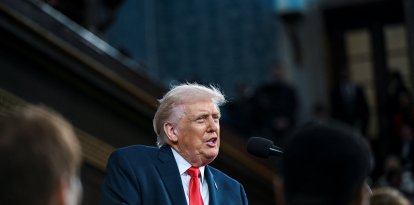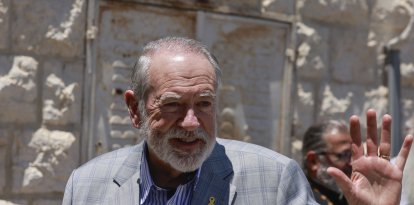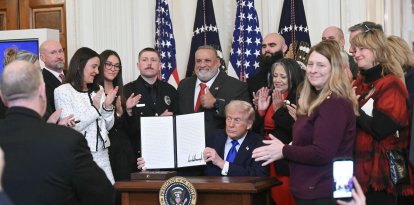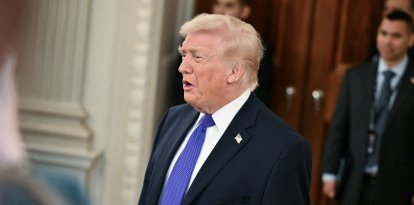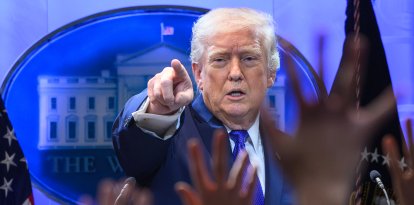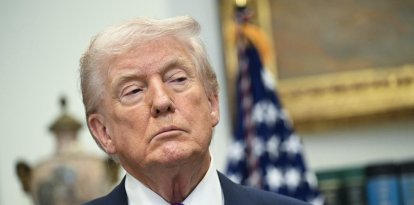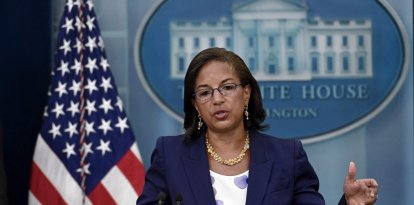ANALYSIS
Profile: Lori Chavez-DeRemer, Trump's Hispanic ex-congresswoman pick for secretary of labor
Viewed with suspicion by her party but supported by key unions, the former mayor will need to secure the new base of working-class Republican voters and deliver on her promise to "Make America Work Again."
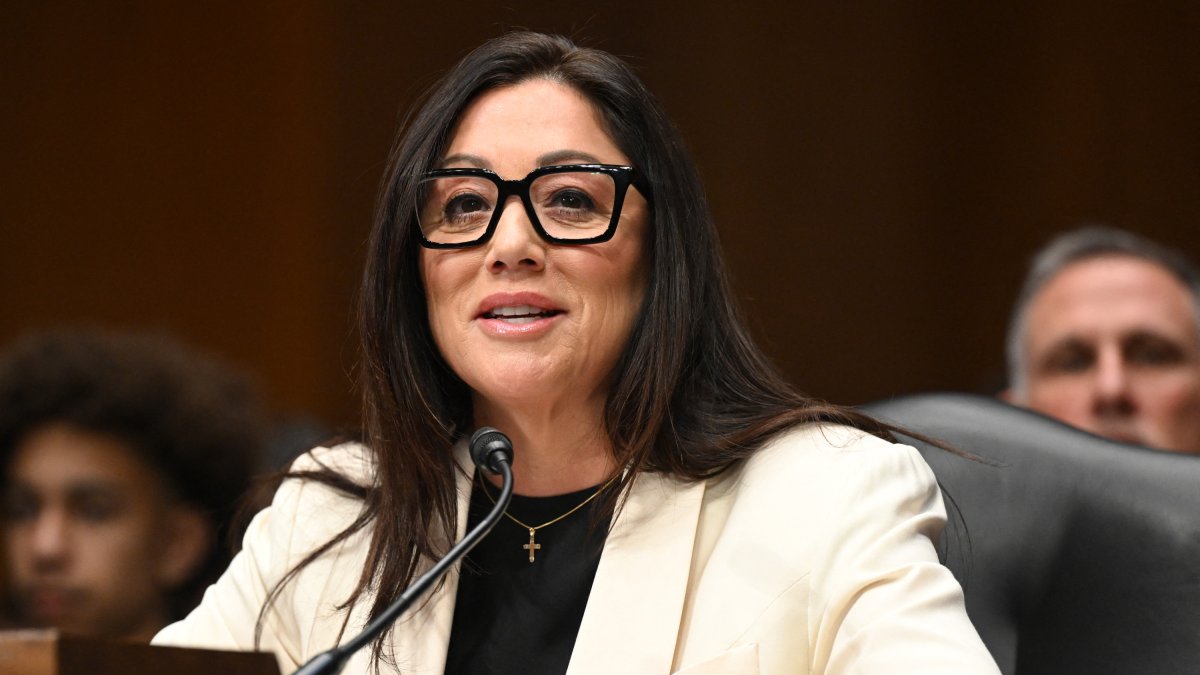
Lori Chavez-DeRemer testifies during a Senate hearing.
Of union and Hispanic heritage, Lori Chavez-DeRemer was not considered a frontrunner for Donald Trump's Cabinet. Though not universally popular within the GOP and lacking a flawless electoral record, her most recent defeat at the polls could serve as the fuel for her biggest political victory: becoming the Secretary of the Department of Labor (DOL).
Although she lost re-election to Congress last year, she gained the support of several local unions. She even earned the backing of the Teamsters, which, by a narrow margin, chose to support a Republican House candidate for the first time in 20 years. This endorsement, from the largest private union in the country, was renewed after her nomination: "The Senate will have the opportunity to put a champion for working people at the head of the Department of Labor."
Her relationship with labor goes back a long way: "Like many Americans, my journey is rooted in the values instilled by my father, a proud Teamster who worked tirelessly for over 30 years," Chavez-DeRemer said at a Senate hearing. "The fair pay and benefits he received ensured our family’s stability and security."
Early steps, fall, rise and fall (yet again)
Born in Hanford, California, she later moved to Happy Valley, Oregon. She grew up in a farming community, in a family with Mexican-American roots. "I’m grateful for the opportunity my grandmother [who immigrated to the U.S.] passed down to me," she shared at a celebration of Hispanic Heritage Month. "I’m proud of my Latina roots and the accomplishments made from the Hispanic community to our great country."
In high school she met the man who would become her husband, Shawn DeRemer. "My high school sweetheart," as she still calls him. "Who has stood by my side through every triumph and challenge." Together, they founded an anesthesia provider company. Decades of experience running a small business, which both Trump and she highlighted to defend her nomination, were key to her credentials.
"We successfully navigated the challenges faced by employers, from complex labor regulations to workforce shortages and rising cost," Chavez-DeRemer said. "These experiences have given me invaluable insights into the struggles and triumphs of American business owners."
As she spoke those words in a congressional chamber, a few rows back were her parents, her husband and one of her daughters (the other, pregnant, was unable to travel: "I know you are watching [on TV], I know you support me here today"). Her family appears intertwined in each of her decisions, including her foray into public service: "Like all parents, my husband and I wanted our daughters to grow up in a safe and thriving community, which sparked my passion for getting involved," she explained last year to Oregon Public Broadcasting (OPB).
After serving on the Parks Committee in Happy Valley, Portland, she made the leap to mayor in 2010. That successful tenure was followed by two setbacks: she lost two consecutive Oregon House races, both to Democrat Janelle Bynum, with the second loss coming by a wider margin. However, four years later, she aimed higher and entered Congress in 2022 after defeating Jamie McLeod-Skinner, a member of the Democratic Party. Her resurgence, however, was short-lived; just two years later, an old acquaintance—Bynum—ousted her from her seat on Capitol Hill.
Although brief, her career on the national stage was enough to generate misgivings within her own party.
What does the DOL do?
With a budget of more than $13 billion, the department employs over 15,000 full-time staff. These employees are organized into various agencies or divisions, each focused on specific areas, such as the Mine Safety and Health Administration (MSHA) and the Office of Disability Employment Policy (ODEP).
Interns and challenges from day one
Chavez-DeRemer is the only Trump nominee who required Democratic votes to pass the first hurdle for any nominee: approval or rejection by the Senate committee overseeing the portfolio they seek to lead.
Kentucky Republican Rand Paul voted against her, openly expressing his displeasure with his party colleague's record. In a second vote, he again cast his rejection. Above all, Paul criticized her support for the PRO Act, a bill backed by the Biden administration that facilitated union creation.
In her defense, the former congresswoman acknowledged that the bill was "imperfect." However, she explained that it was the tool available to her as a legislator to address the need for updated labor laws. She also pledged that, as secretary, she would carry out the president's agenda and acknowledged that while "we will not always agree," she promised that "there will never be surprises."
Throughout her local and national career, she built a reputation as a moderate and frequently emphasized her commitment to finding bipartisan solutions. "In this position, there were no Republican problems or Democrat problems—only problems that needed to be addressed. I know how to put politics aside to get the job done," she once told OPB. Her campaign highlighted that Roll Call had named her the second most bipartisan congresswoman based on her voting record. She also takes pride in the fact that her twin daughters split along party lines—one a Democrat, the other a Republican.
Some of her past statements have also been poorly received by a segment of the GOP, such as when she plainly answered "Joe Biden" to the question of who won the 2020 election, without hesitation or spin.
That may not be the only internal opposition Chavez-DeRemer faces. In recent weeks, DOL employees have rallied with placards to protest government actions, particularly cuts to the department. These protests were further supported by unions sympathetic to the future secretary.
Liz Shuler, president of the AFL-CIO union, was one of the speakers at the demonstrations near the department. While critical of Trump, Shuler praised Chavez-DeRemer but questioned her influence: "It remains to be seen what she will be permitted to do as Secretary of Labor in an administration with a dramatically anti-worker agenda." This stance mirrors that of Randi Weingarten, president of the AFT.
Make America Work Again
The working class, once considered a cautious group for the Democratic Party, was part of the broad coalition of voters that helped reopen the doors to the White House for Trump. This included majority support within the Teamsters, with 60% of its members preferring the Republican over Harris in an internal poll. The union, which had supported the Democratic ticket since 1996, ultimately declared itself neutral.
As Secretary of Labor, Chavez-DeRemer will have the dual task of preserving her new base of supporters while advancing the Make America Great Again agenda.
Her vision for "Putting American Workers First" includes investing in "educational pathways beyond the traditional four-year degree," as well as trying to reverse what she defines as "accelerated layoffs" at the country's big companies, such as Ford or Stellantis and a drop in wages over the past four years.
"Pragmatic solutions to support hardworking Americans," as she put it, or as Trump put it, "Making America Richer, Wealthier, Stronger and more Prosperous than ever before."















